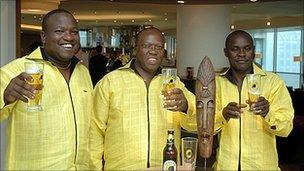Diageo profits bolstered by emerging markets
- Published
Diageo's net profits rose by 15%
Diageo, the world's biggest spirits maker, has reported a 15% rise in half-year pre-tax profits helped by good trading in emerging markets.
The producer of Smirnoff vodka, Johnnie Walker whisky and Guinness made profits of £1.6bn with sales up 3% to £7.1bn.
Diageo said better trading in Latin America, Africa and Asia had helped to offset weaker sales in Europe where consumers moved to cheaper drinks.
The firm predicted higher profit growth this year as key markets recovered.
Some European markets - including Greece, Spain and the Irish Republic - had struggled, though this was not surprising given growing unemployment, cut state benefits, and lower consumer confidence amid sinking property prices, said Diageo's chief executive Paul Walsh.
"There's no question that we as a business do better when there's good GDP growth and good consumer confidence," he told the BBC, but he added that its sales in Germany, France, Russia and eastern Europe were strong.

Africa is one of Diageo's key emerging markets through beers such as Tusker
"Despite the economic weakness in much of Europe, our first half performance gives me increased confidence that we will improve on the organic operating profit growth we deliver," he added.
Latin America, Africa and Asia make up about a third of group earnings.
It has a large Scotch business in South America and a sizeable beer business in Africa through brands such as Tusker, as well as Guinness. Growth in those markets has kept up throughout the global downturn.
It is also building up a market in China, particularly with Johnnie Walker.
Diageo shares were down in morning trading, but Richard Hunter, head of UK equities at Hargreaves Lansdown stockbrokers, said this belied "a progressively strong underlying story".
"Whilst demand in Europe remains relatively weak, Diageo has continued to benefit from its geographical diversification," he added.
However, analysts at Investec Securities were less upbeat, calling Diageo's report "a poor result with further hangover to come", saying the drinks giant faced a hit from the impact of foreign exchange movements.
- Published26 January 2011